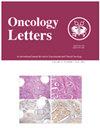弥漫型胃癌患者基质细胞中结缔组织生长因子表达的预后意义
IF 2.2
4区 医学
Q3 ONCOLOGY
引用次数: 0
摘要
结缔组织生长因子(CTGF)是Hippo信号通路的一个靶基因。CTGF在胃癌(GC)组织学类型中的不同作用尚不清楚;因此,本研究旨在根据组织学类型确认CTGF在GC患者癌细胞和基质细胞中表达的临床意义。本研究共纳入了 589 例胃癌患者。采用免疫组化方法分析 CTGF 在癌细胞和基质细胞中的表达。CTGF mRNA表达数据和GC样本的相应临床信息来自癌症基因组图谱(TCGA)数据库。随后,研究人员探讨了 CTGF 表达与多种临床病理因素之间的关联。在本研究中,CTGF主要在癌细胞和基质细胞的细胞质中表达。基质细胞中 CTGF 的表达与癌细胞中 CTGF 的表达明显相关(P<0.001)。基质细胞中的 CTGF 阳性还与肠型、非溃疡型、肿瘤深度(T1-2)、淋巴结转移(阴性)、淋巴侵袭(阴性)和肿瘤大小(<5 cm)明显相关。基质细胞中 CTGF 的低表达与较差的总生存期(OS)独立相关。此外,基质细胞中 CTGF 低表达的患者,尤其是弥漫型 GC 患者的 OS 明显低于 CTGF 高表达的患者(P=0.022)。这一趋势与TCGA数据分析显示的趋势相似。总之,CTGF低表达与弥漫型GC患者的OS明显较差有关。这些数据表明,CTGF及其受Hippo通路的控制可被视为弥漫型GC的潜在治疗靶点。本文章由计算机程序翻译,如有差异,请以英文原文为准。
Prognostic significance of connective tissue growth factor expression in stromal cells in patients with diffuse‑type gastric cancer.
Connective tissue growth factor (CTGF) is a target gene of the Hippo signaling pathway. Its differential role in the histological types of gastric cancer (GC) remains unknown; therefore, the present study aimed to confirm the clinical significance of CTGF expression in cancer and stromal cells in patients with GC depending on the histological type. The present study enrolled 589 patients with GC. Immunohistochemistry was used to analyze CTGF expression in cancer and stromal cells. CTGF mRNA expression data and the corresponding clinical information of GC samples were collected from The Cancer Genome Atlas (TCGA) database. Subsequently, the associations between CTGF expression and several clinicopathological factors were investigated. In the present study, CTGF expression was mainly observed in the cytoplasm of cancer and stromal cells. CTGF expression in stromal cells was significantly associated with CTGF expression in cancer cells (P<0.001). CTGF positivity in stromal cells was also significantly associated with intestinal type, non-scirrhous type, tumor depth (T1-2), lymph node metastasis (negative), lymphatic invasion (negative) and tumor size (<5 cm). Low CTGF expression in stromal cells was independently associated with worse overall survival (OS). Furthermore, the OS of patients with low CTGF expression in stromal cells, especially in patients with diffuse-type GC, was significantly worse than patients with high CTGF expression (P=0.022). This trend was similar to that revealed by TCGA data analysis. In conclusion, low CTGF expression was associated with a significantly worse OS in patients with diffuse-type GC. These data indicated that CTGF, and its control by the Hippo pathway, may be considered potential treatment targets in diffuse-type GC.
求助全文
通过发布文献求助,成功后即可免费获取论文全文。
去求助
来源期刊

Oncology Letters
ONCOLOGY-
CiteScore
5.70
自引率
0.00%
发文量
412
审稿时长
2.0 months
期刊介绍:
Oncology Letters is a monthly, peer-reviewed journal, available in print and online, that focuses on all aspects of clinical oncology, as well as in vitro and in vivo experimental model systems relevant to the mechanisms of disease.
The principal aim of Oncology Letters is to provide the prompt publication of original studies of high quality that pertain to clinical oncology, chemotherapy, oncogenes, carcinogenesis, metastasis, epidemiology and viral oncology in the form of original research, reviews and case reports.
 求助内容:
求助内容: 应助结果提醒方式:
应助结果提醒方式:


